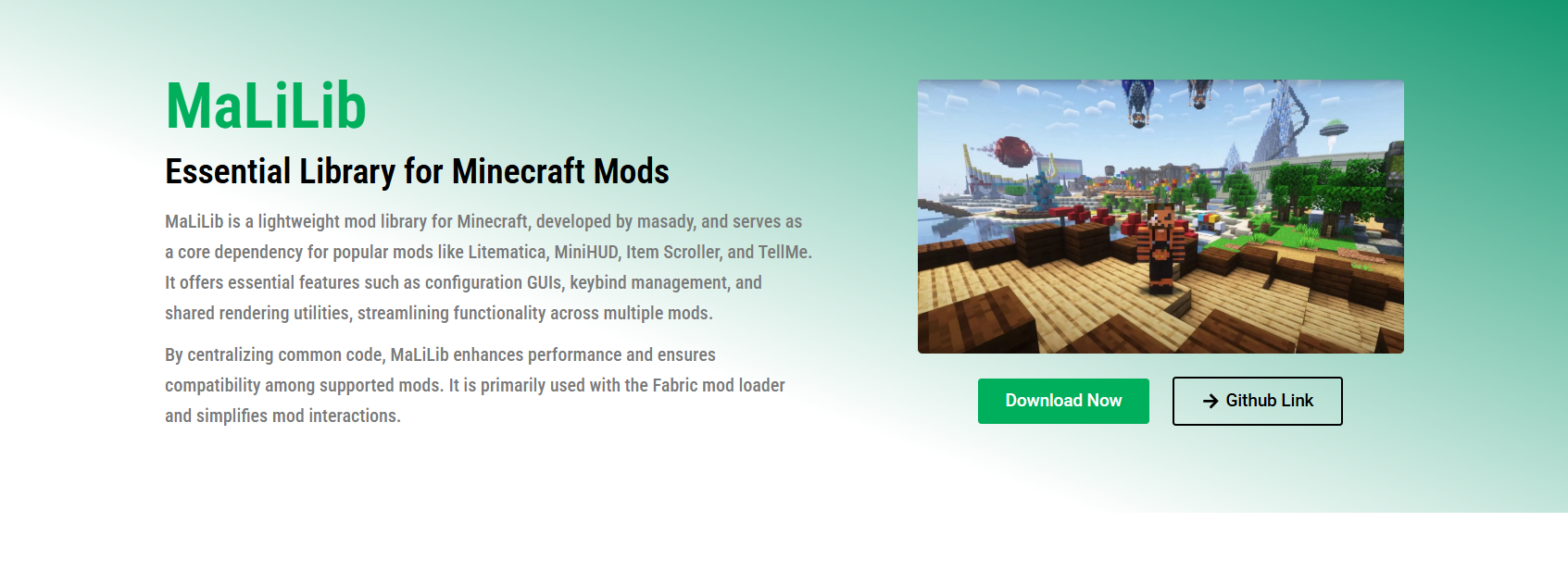MaLiLib is a lightweight and essential library mod created by Masa, the developer behind popular client-side mods like Litematica and MiniHUD. While it doesn’t add content or features directly, it plays a crucial background role in ensuring other mods work smoothly and efficiently. If you’re running complex Minecraft mods, chances are you’ve already seen MaLiLib as a dependency.
Its purpose is to provide a shared base of code that multiple mods can access. This saves developers from writing duplicate logic and ensures consistency across various mods. With MaLiLib, mods speak the same language, helping to reduce crashes, version mismatches, and other common headaches.
Mod compatibility can make or break your gameplay experience. Whether you’re building complex structures or customizing your HUD, MaLiLib improves how mods communicate and cooperate. Let’s break down how MaLiLib enhances compatibility across the Minecraft modding scene.
Shared Framework for Client-Side Mods
Centralized Codebase for Mod Functions
MaLiLib provides a centralized codebase that mods like Litematica and MiniHUD depend on. By unifying standard functions, it reduces redundancy and streamlines mod performance. This core architecture helps eliminate conflicts caused by multiple mods attempting to perform similar tasks in different ways.
Reduces Redundant Development
Developers using MaLiLib don’t have to write the same features repeatedly for each mod. Basic UI components, configuration logic, and input handling are already included. This leads to better optimization and compatibility across all mods that rely on it.
Simplifies Inter-Mod Communication
MaLiLib acts as a translator between mods. When multiple client-side mods are enabled, they need to share key data and settings. Through MaLiLib’s shared framework, this communication becomes seamless and consistent, improving the way mods interact without stepping on each other’s toes.
Smooth Integration with Dependent Mods
Seamless Support for Litematica
One of the key mods that depend on MaLiLib is Litematica, a tool for schematic placement and building guidance. MaLiLib ensures Litematica runs without errors by handling rendering logic, input mappings, and data formats. This direct support makes the mod integration flawless.
Vital Backbone for MiniHUD
MiniHUD relies on MaLiLib to display technical overlays, such as block light levels and coordinates. MaLiLib manages much of the background processing, ensuring that the mod’s data overlays are accurate, well-aligned, and conflict-free across Minecraft versions.
Ensures Consistent Mod Settings
Without MaLiLib, each mod would store and manage settings differently, leading to confusion and potential bugs. MaLiLib establishes a standardized system for handling configuration files and in-game menus, ensuring users have a consistent experience regardless of which mod they install.
Key Advantages of MaLiLib Integration:
- Prevents version conflicts across multiple mods
- Reduces code duplication for developers
- Offers a consistent UI and configuration method
Enhancing Cross-Version Stability
Automatic Compatibility Adjustments
Minecraft mod versions frequently update with game releases. MaLiLib provides auto-adjustment tools that allow dependent mods to handle these changes more gracefully. It eliminates the need for constant rewrites by providing a stable foundation that evolves with the game.
Streamlined Updates for Developers
When Minecraft updates, developers can rely on MaLiLib to manage most of the backend code updates. Instead of updating each mod individually, changes in MaLiLib automatically ripple out to dependent mods, making the development process more efficient and reducing errors.
Reduced Conflict Between Fabric and Forge
MaLiLib supports both Fabric and Forge mod loaders. By maintaining compatibility with both environments it allows mod developers to write one version of their mod and still reach a wider audience. This dual support reduces cross-loader issues and increases stability.
Performance Optimization and Resource Sharing
Lightweight Performance Footprint
Despite being powerful, MaLiLib is optimized for performance. It uses minimal system resources while still managing complex background processes. This ensures it won’t impact game performance, even when multiple mods are installed.
Shared Resource Libraries
Mods using MaLiLib benefit from shared graphics, data management, and input systems. Instead of each mod loading its own versions of these resources, they all tap into MaLiLib’s centralized pool. This reduces memory consumption and load times.
Reduced Crash Risk on Mod Conflicts
Mods often crash when two mods attempt to perform the same function in incompatible ways. MaLiLib eliminates this by providing standardized handling for GUI, events, and config files. This reduces the likelihood of overlapping functionalities clashing with each other.
MaLiLib Helps Optimize:
- Memory usage by reducing redundant assets
- Input management with unified keybinds
- Resource access across multiple mods
Consistent User Experience Across Mods
Unified UI for Mod Menus
All MaLiLib-based mods adhere to a consistent visual structure for their menus and configurations. Whether you’re adjusting HUD settings in MiniHUD or schematic controls in Litematica, the user interface looks and feels the same. This consistency improves usability.
Standardized Keybind System
MaLiLib allows mods to use a centralized keybind manager. Players no longer need to guess or reconfigure keybinds across every mod. Instead, all supported mods show their controls in one place and avoid overlapping key assignments.
Synchronized Configurations
When multiple MaLiLib-supported mods are installed, their settings can be managed together. Players can export, back up, or copy settings easily from one mod to another. This synchronization saves time and maintains consistency across gameplay styles.
Benefits to Users Include:
- Fewer mod menu conflicts
- Easier learning curve with familiar controls
- Quick configuration management for all mods
Broad Support and Developer Adoption
Encouraged by Major Mod Creators
Many high-profile modders now recommend or require MaLiLib for their client-side tools. This endorsement speaks volumes about its stability and reliability. The modding community continues to embrace it for the benefits it brings to both users and developers.
Active Community and Updates
MaLiLib is actively maintained with updates that align with the latest Minecraft versions and mod loaders. This ongoing support means modders don’t have to start from scratch with every update and can rely on MaLiLib to stay compatible.
Foundation for Future Mods
New client-side mods are now being built with MaLiLib from the ground up. Its standardized structure encourages best practices and makes future mod development faster, cleaner, and more efficient. As the ecosystem grows, MaLiLib remains a vital backbone.
Why Developers Choose MaLiLib:
- Saves development time
- Simplifies version maintenance
- Offers reliable community-tested code
Conclusion
MaLiLib improves mod compatibility by offering a stable, lightweight, and standardized core for client-side mods. It reduces crashes, eliminates redundant code, and simplifies communication across different mods. With support for Fabric and Forge, MaLiLib enhances mod interoperability and ensures a smoother user experience. Whether you’re a player or a developer, using MaLiLib unlocks a more stable, optimized, and future-proof modding environment for Minecraft enthusiasts across all versions.

